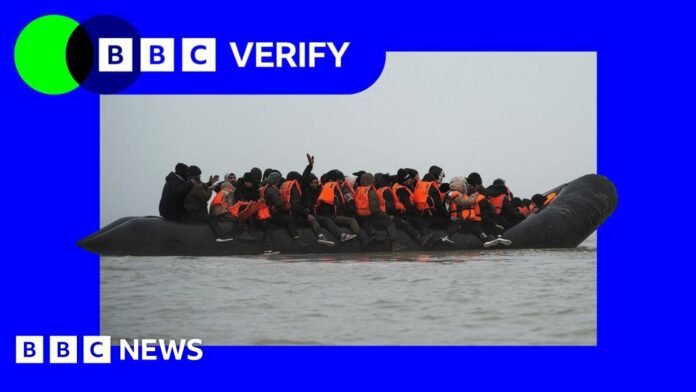BBC Verify
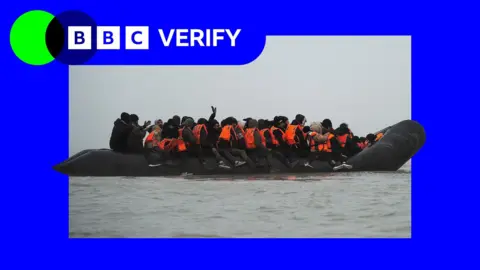 Getty Images
Getty ImagesThe prime minister has made tackling illegal immigration and “restoring order” to the asylum system a priority for the government.
Sir Keir Starmer has promised to “smash the gangs”. It follows predecessor Rishi Sunak’s pledge to “stop the boats”.
BBC Verify looks at key government pledges – including tackling small-boat crossings, ending the use of asylum hotels and returning more people with no right to be in the country.
‘End asylum hotels’
Labour promised to “end asylum hotels, saving the taxpayer billions of pounds” in its general election manifesto.
The government wants to fulfil this pledge by 2029.
However, recent figures show there were more asylum seekers staying in hotels in June 2025 compared with June 2024 – a few days before the general election.
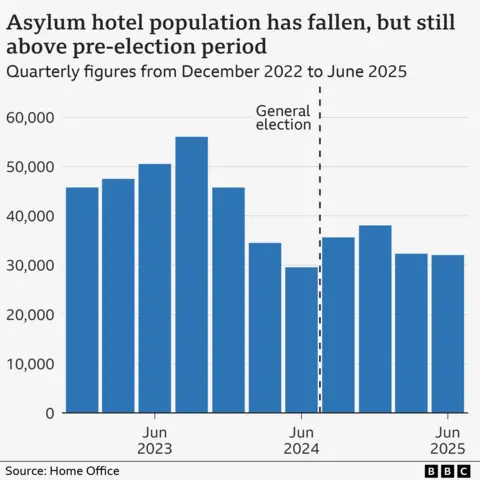
At the end of June 2025, there were 32,059 people in hotels – up 2,474.
Despite the rise over 12 months, the number has fallen by 286 since March 2025.
The government does not regularly publish figures on the number of actual hotels in use but government sources have suggested there are 210 asylum hotels, slightly down from 212 in July 2024.
The asylum process determines whether a person can remain in the UK because they have a “well-founded fear of persecution” in their home country.
Once someone applies for asylum, they gain legal protections while awaiting a decision – including accommodation if they cannot support themselves financially.
Almost everyone who arrives by small boat claims asylum – they made up a third of all asylum applications over the past 12 months. Another large group of claimants were people already in the UK who had overstayed their visas.
Since 2020, the government has been increasingly reliant on hotels, partly because the supply of other types of asylum accommodation has not kept up with the numbers arriving in small boats.
But using asylum hotels is expensive – costing £5.7m per day in 2024-25. The government has started to save money by adding beds to rooms in hotels to maximise the number of people in each site.
The Independent Chief Inspector of Borders and Immigration, David Bolt, told Parliament in June, that he did not believe the government would meet its pledge: “Frankly, I do not think that it will be achieved”, he said.
“They are very large numbers, and it is very hard to see how they are going to be reduced significantly, even over the length of the Parliament.”
‘Smash the gangs’
As of 20 August, 27,997 people had arrived in the UK in small boats in 2025 – up by about 45% compared with the same period in 2024.
To reduce the number of crossings, the government has pledged to disrupt the people-smuggling gangs behind them.
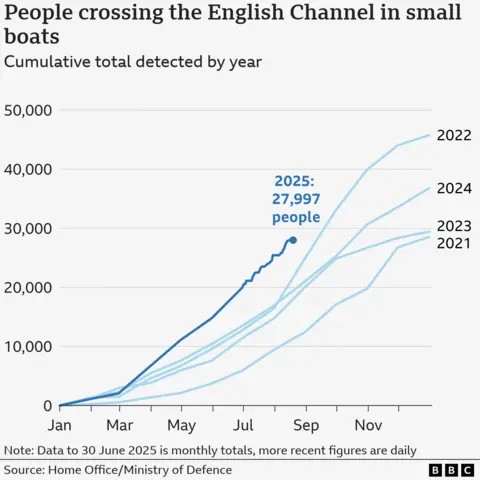
But it is unclear how the government plans to measure its progress, or when this goal will be met.
The Home Office told us data on actions taken by officials to disrupt criminal gangs was “being collected and may be published in the future”.
There is some information on efforts to prevent small boat crossings by French authorities – who, under a 2023 deal, are receiving £476m from the UK over three years.
They say about 33,468 people were prevented from crossing between July 2024 and August 2025. We do not know what happened to them or whether they tried to cross again.
There have been high-profile cases of UK-based smugglers being sentenced, including a man who helped smuggle more than 3,000 people.
In July, the UK and France agreed to a “one in, one out” pilot. Under the scheme, for each migrant the UK returns to France, another migrant with a strong case for asylum in Britain will come the other way.
The vast majority of UK immigration is legal – this includes people who have been granted permission to come to work, study, claim asylum or for other authorised purposes.
Over the past 12 months, about 49,000 people entered the UK illegally – about 5% of the nearly one million people who immigrated to the UK between July 2024 and June 2025.
‘Clear the asylum backlog’
The government has also promised “to clear the asylum backlog“.
This refers to the backlog of claims by asylum seekers who are waiting to hear whether they will be granted refugee status and be allowed to remain in the UK.
Since last June, there has been a 55% increase in decisions on asylum cases.
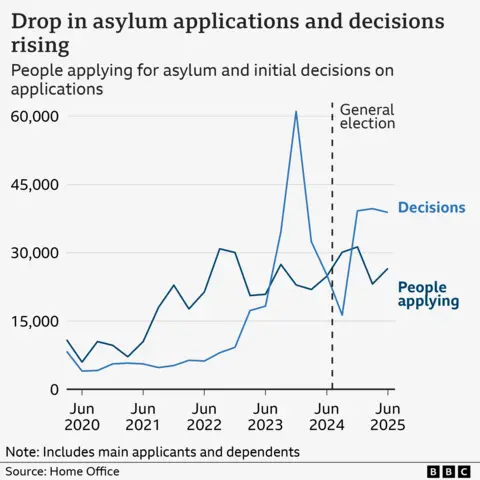
This, combined with a recent fall in applications has meant the overall backlog of asylum cases has fallen compared with the end of June 2024.
Under Labour, 39% of asylum claims were granted in the year to June 2025. This is lower than under the Conservatives the previous year, when about 44% of claims were granted.
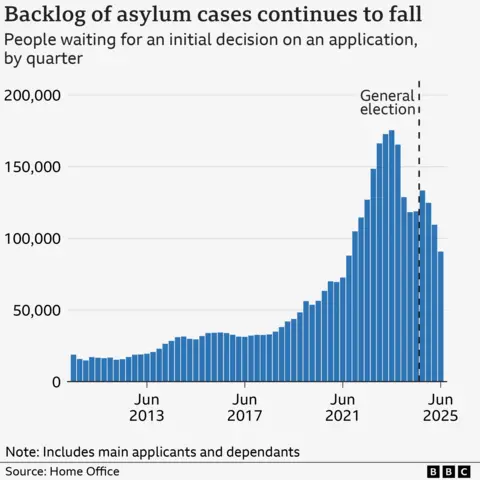
Another backlog the government wants to clear is the high number of court appeals from asylum seekers following rejected claims.
That backlog has got worse since last summer’s election. There were nearly 51,000 in March 2025 – a record high.
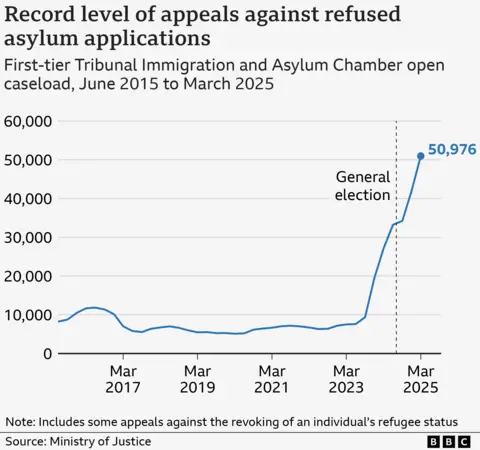
‘Increase returns’
The government has also promised to “increase returns” of people with no legal right to be in the UK. It said it would set up a new returns and enforcement unit with 1,000 extra staff.
Between July 2024 (when Labour came to power) and July 2025, there were 35,052 returns recoded by the Home Office.
This is up 13% compared with the same period 12 months ago.
So the government is meeting this pledge but it is worth noting that just 9,115 people were forcibly removed – which could involve being escorted on a plane by an immigration official.
The figures also show 10,191 failed asylum seekers were returned in this period but they do not say how many were enforced or voluntary.
Separate government figures from April to June gave a fuller breakdown showing many of those who did leave voluntarily did so without government assistance or even its knowledge at the time, as BBC Verify has previously pointed out.
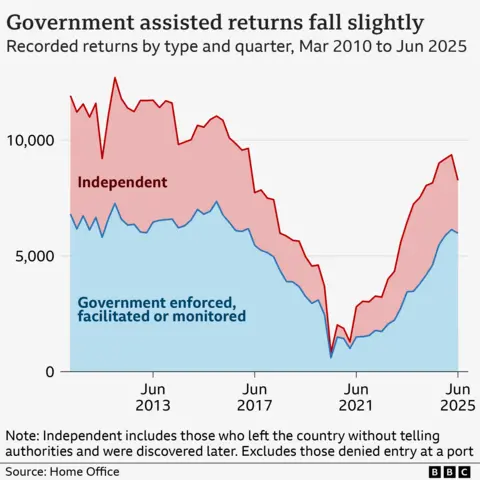
This is despite repeated claims from ministers that the government has “removed” or even “deported” this many people.
The Home Office says all returns outcomes are the result of collective efforts by the department.




